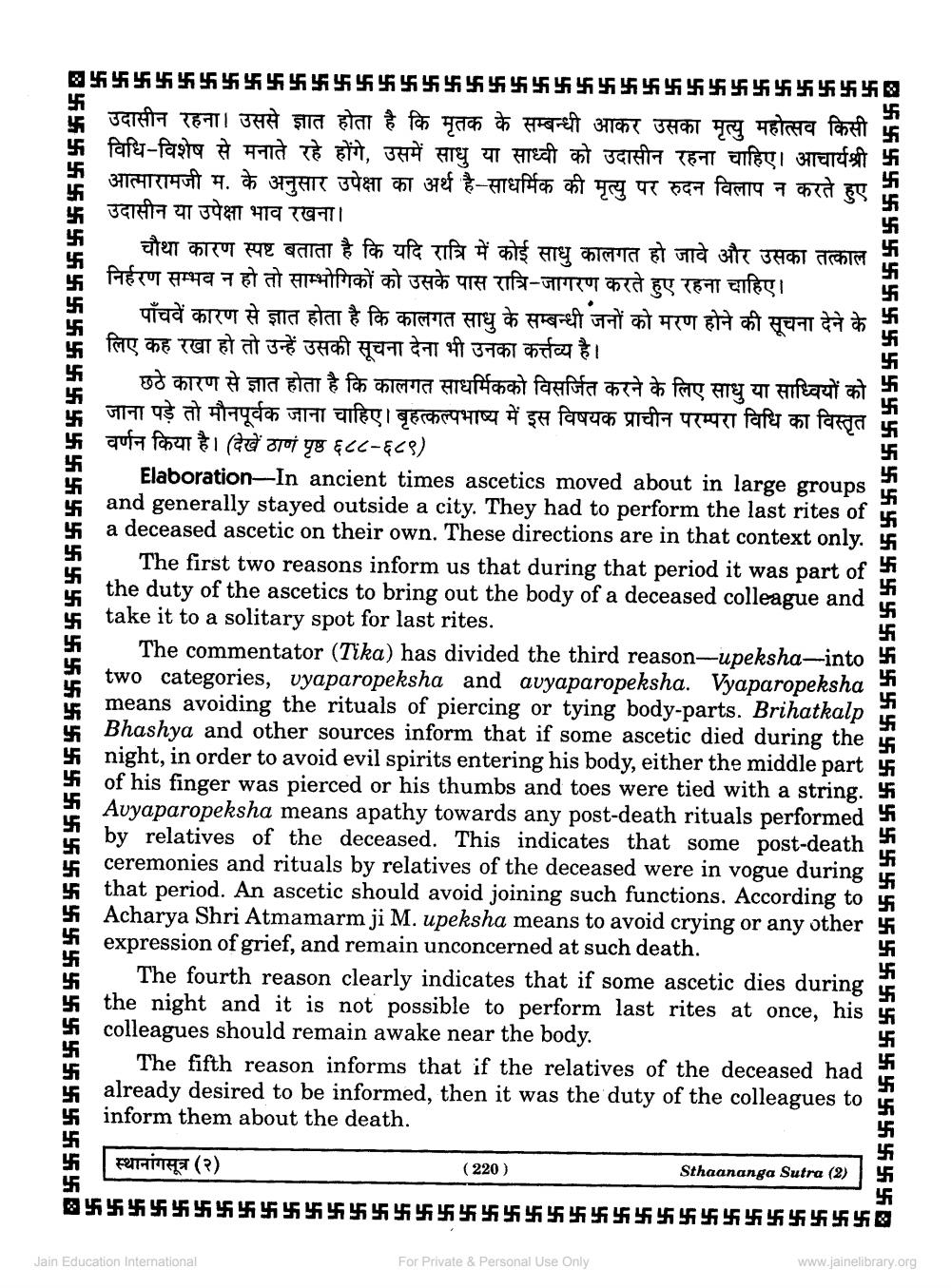________________
फ्र
5 विधि-विशेष से मनाते रहे होंगे, उसमें साधु या साध्वी को उदासीन रहना चाहिए। आचार्यश्री
5
卐
आत्मारामजी म. के अनुसार उपेक्षा का अर्थ है - साधर्मिक की मृत्यु पर रुदन विलाप न करते हुए उदासीन या उपेक्षा भाव रखना ।
5
फ्र
पाँचवें कारण से ज्ञात होता है कि कालगत साधु के सम्बन्धी जनों को मरण होने की सूचना देने के फ लिए कह रखा हो तो उन्हें उसकी सूचना देना भी उनका कर्त्तव्य है।
卐
卐
5
छठे कारण से ज्ञात होता है कि कालगत साधर्मिकको विसर्जित करने के लिए साधु या साध्वियों को जाना पड़े तो मौनपूर्वक जाना चाहिए। बृहत्कल्पभाष्य में इस विषयक प्राचीन परम्परा विधि का विस्तृत 5 वर्णन किया है। (देखें ठाणं पृष्ठ ६८८-६८९)
卐
卐
फ्र
उदासीन रहना । उससे ज्ञात होता है कि मृतक के सम्बन्धी आकर उसका मृत्यु महोत्सव किसी
फ्र
चौथा कारण स्पष्ट बताता है कि यदि रात्रि में कोई साधु कालगत हो जावे और उसका तत्काल निर्हरण सम्भव न हो तो साम्भोगिकों को उसके पास रात्रि जागरण करते हुए रहना चाहिए।
फ्र
Elaboration-In ancient times ascetics moved about in large groups
and generally stayed outside a city. They had to perform the last rites of
a deceased ascetic on their own. These directions are in that context only.
The first two reasons inform us that during that period it was part of the duty of the ascetics to bring out the body of a deceased colleague and take it to a solitary spot for last rites.
The commentator (Tika) has divided the third reason-upeksha-into two categories, vyaparopeksha and avyaparopeksha. Vyaparopeksha means avoiding the rituals of piercing or tying body-parts. Brihatkalp Bhashya and other sources inform that if some ascetic died during the night, in order to avoid evil spirits entering his body, either the middle part of his finger was pierced or his thumbs and toes were tied with a string. Avyaparopeksha means apathy towards any post-death rituals performed
by relatives of the deceased. This indicates that some post-death ceremonies and rituals by relatives of the deceased were in vogue during
that period. An ascetic should avoid joining such functions. According to
Acharya Shri Atmamarm ji M. upeksha means to avoid crying or any other expression of grief, and remain unconcerned at such death.
The fourth reason clearly indicates that if some ascetic dies during the night and it is not possible to perform last rites at once, his colleagues should remain awake near the body.
The fifth reason informs that if the relatives of the deceased had already desired to be informed, then it was the duty of the colleagues to inform them about the death.
स्थानांगसूत्र (२)
(220)
Jain Education International
Sthaananga Sutra (2)
தமிழிழதமிழக தமிழகமிமிமிமி*தமிழதிமிமிமிமிமிமிமிமிமிழ
For Private & Personal Use Only
फ्र
卐
55 5 5 5 5 5 5 5 5 5 5 55 5 5 55 55 5 5 55559555 5 5 5 5 5 5 5 5 5 5 5 595952
www.jainelibrary.org




